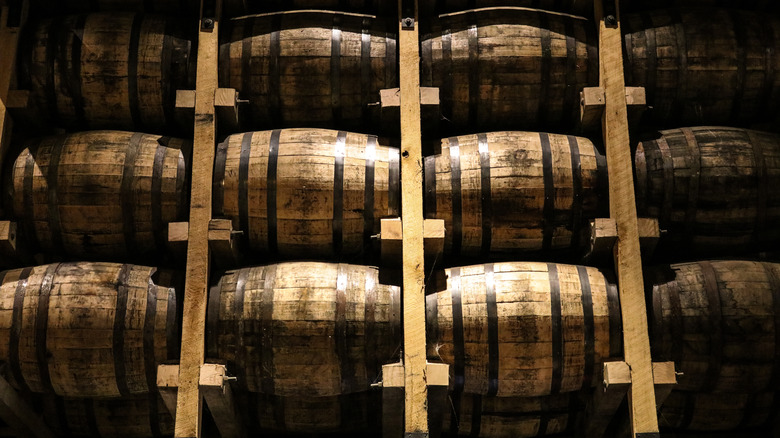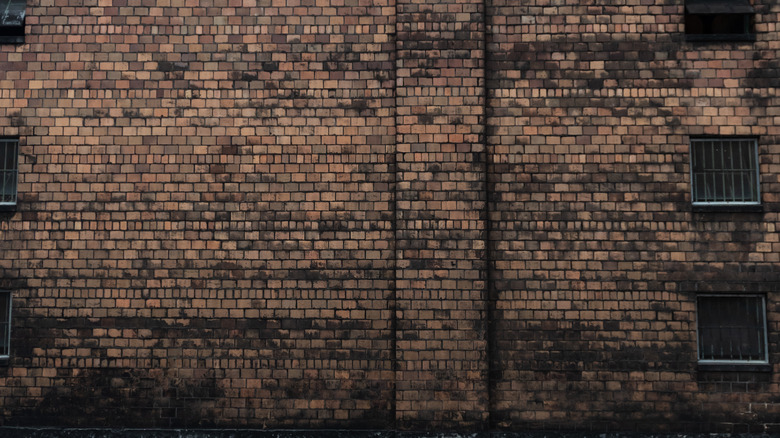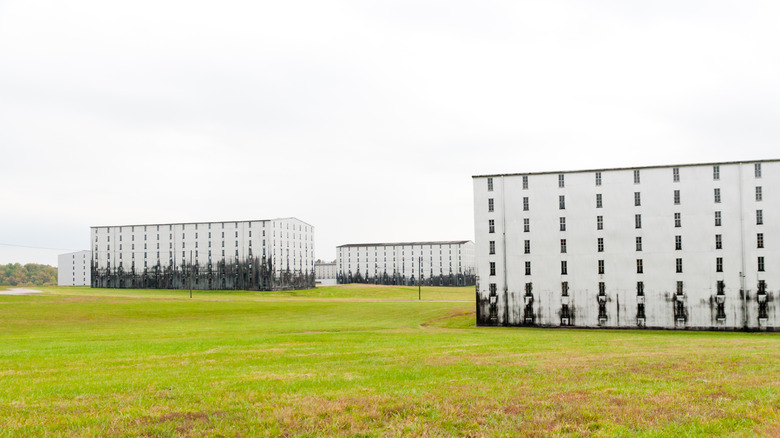What Is Whiskey Fungus And How Is It Taking Over A Tennessee Town?
In 2018, Jack Daniel's began construction on six new barrelhouses near the small, unincorporated community of Mulberry in Lincoln County, Tennessee. At first, the move seemed like it would strengthen the bond between America's best-selling whiskey and its homeland. Neighboring Moore County is home to the Jack Daniel's distillery, registered in 1866 in Lynchburg, just across the county line from Mulberry. The region is so steeped in whiskey history that the charcoal filtering process that gives Tennessee whiskey its distinctively mellow finish is known amongst distillers as the 'Lincoln County process.' Hopes were high enough that Jack Daniel's soon announced plans to build 14 more barrelhouses in the same area.
Less than five years later, the future of those 14 barrelhouses, as well as the fate of the six that already stand, has been thrown into question. Lincoln County looks very different than it did back in 2018, and not in a good way. Something is taking over the land. You can see it on the houses, the cars, and the street signs. At first, it looks like a layer of soot staining every surface in sight, but in reality, it's something much more worrisome. They call it "whiskey fungus," and it has the people of Lincoln County fearing for their health.
Whiskey fungus feeds on ethanol fumes
Whiskey fungus is the colloquial name of Baudoinia compniacensis, a pervasive fungal species that feeds on ethanol fumes. It was initially discovered (and later named after) by a French pharmacist named Antonin Baudoin, who encountered it in the town of Cognac. The ethanol that feeds Baudoinia is something distillers call the "angels' share." When alcohol is aged in wooden barrels, as whiskey and cognac are, some of it evaporates. This can amount to a 2% loss of volume every year (even more during a hot Tennessee summer). Thus, the air around distilleries is unusually rich in ethanol, providing an ideal spawning environment for whiskey fungus. The same phenomenon can sometimes be observed near bakeries since ethanol is a byproduct of bread rising.
At best, whiskey fungus is an expensive nuisance. It forms dense colonies on every free surface it can find, binding so strongly that it takes a power washer to remove it. But that's not the biggest concern for those living in fungus-ridden areas like Lincoln County. It's health, specifically respiratory health, that raises the most concerns. There is currently no data suggesting that whiskey fungus is dangerous to humans; however, very little research has actually been done on the matter. The optimism is based on a lack of evidence. Meanwhile, the fungus has been found to kill trees and corrode the surfaces of cars.
What does this mean for the future of Lincoln County?
The spread of whiskey fungus in Lincoln County, Tennessee has enraged locals, stirring up legal problems for Jack Daniel's and the county government. In December 2022, a public hearing at the Lincoln County Courthouse drew approximately 200 attendees. Community members voiced serious concerns about the air quality around the barrelhouses, including Becky Benson Carroll, who has stage four lung cancer. According to The Moore County News, Carroll disclosed her illness to county commissioners, saying, "I can't prove it was from this ethanol, but somebody needs to prove that it is not." Melvin Keebler, a representative for Jack Daniel's who attended the meeting, told Carrol that she had their "sympathy and empathy," but that "The air quality inside the warehouses is monitored continuously."
For most Lincoln County residents, monitoring is not enough. There have been many calls for Jack Daniel's to install air filtration systems, and while the company has not announced plans to do so yet, one local couple has given them a push. Christi and Patrick Long own The Manor at ShaeJo, an event center adjacent to the new barrelhouses. Christi says she's developed respiratory problems, and the couple spends $10,000 a year on power-washing. After checking local records, the Longs found that Jack Daniel's only had permits for two of the 20 barrelhouses they planned, so Christi sued the zoning office. This resulted in a work stoppage order, temporarily halting the barrelhouses, but the long-term outcome remains unclear.


